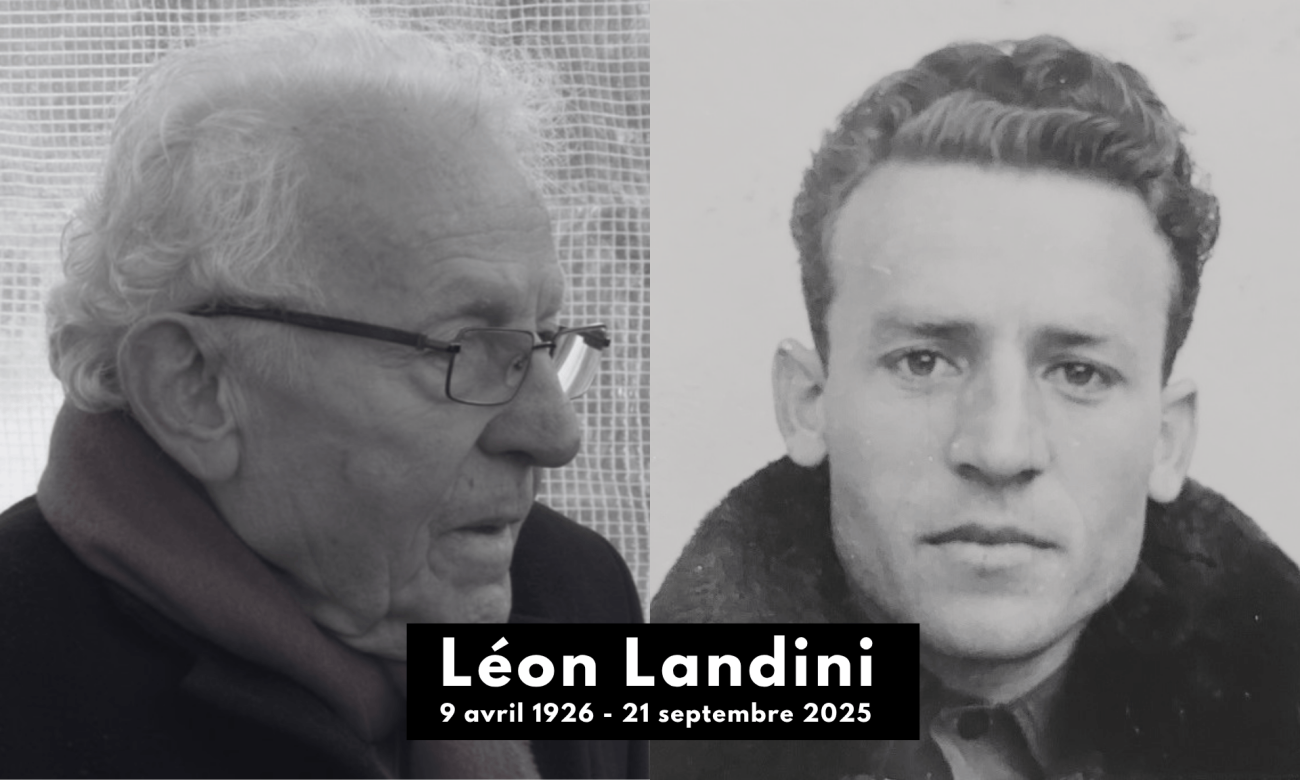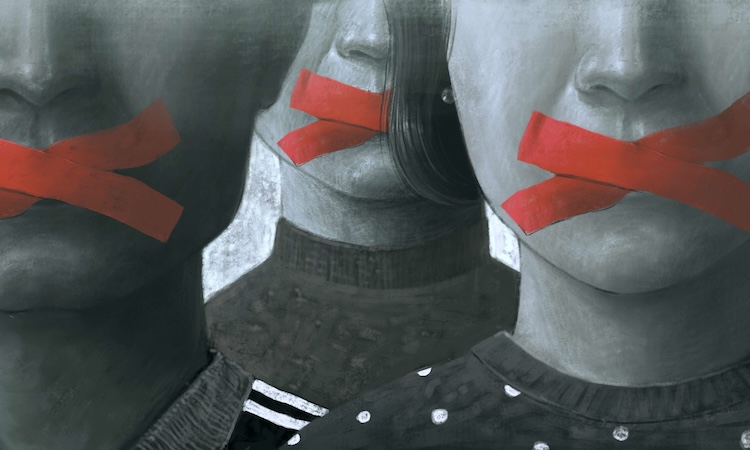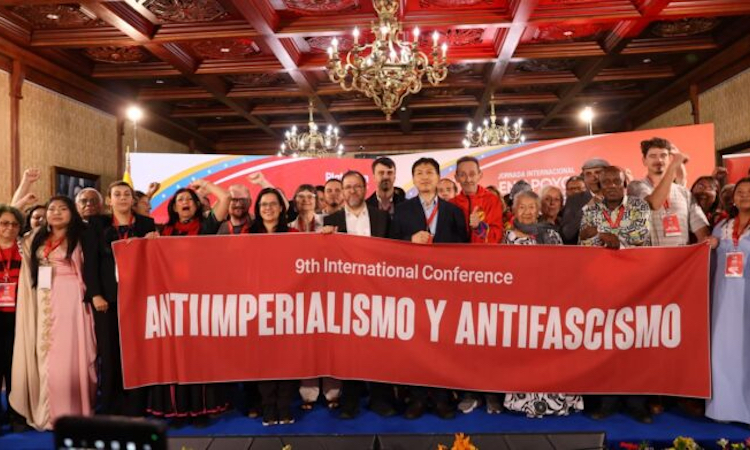This article is reproduced from the World Anti-imperialist Platform’s Youth Platform website, with thanks.
*****
In the run-up to the 80th anniversary of the victory over fascism, the second International Anti-Fascist Forum (IAFF), organised by the Communist Party of the Russian Federation (KPRF) was held in Moscow from 21-25 April 2025.
The event was attended by 450 delegates from 91 countries, representing 164 organisations. Many members of the International Meeting of Communist and Workers’ Parties (IMCWP), as well as organisations affiliated with the World Anti-imperialist Platform (Platform), took this opportunity to express a strong voice against the worldwide resurgence of fascism.
One party notably bsent from this event was the Communist Party of Greece (KKE). Instead of showing solidarity with those who struggle against fascism (including many parties of the IMCWP, of which KKE is a member), it used this moment to yet again criticise not just the KPRF or the Platform (which has been its usual practice up to this point), but also to spread numerous falsehoods regarding the character of modern-day fascism and imperialism, with the ultimate goal of putting an equal sign between the imperialist and anti-imperialist camps.
This time, the criticism was presented in an article in Rizospastis on 4 May, entitled ‘On the International Anti-Fascist Forum of Moscow’, and signed by the international relations section of the KKE’s central committee.
The reason for analysing the aforementioned article is the fact that today’s communist movement finds itself in the midst of an ideological struggle between opportunist and anti-imperialist forces. The leadership of the KKE – a party which has a rich history and still holds significant influence and authority among numerous communist and left-wing organisations – has been watering down and revising its political line for several years (some would say even decades), up to the point where, in practice, it has completely abandoned any substantial struggle either against capitalism in its own country or imperialism worldwide.
Unfortunately, the incorrect political line of the KKE leadership tends to confuse and mislead many comrades both within Greece and internationally, who, due to a lack of proper theoretical education, can easily fall for half-truths and lies that are hidden behind the party’s strong communist iconography and rich party tradition. The Youth Platform has therefore written this article to correct confusion among the comrades who are willing to conduct real day-to-day struggle against imperialism and capitalism, with the additional aim of providing a clear political line and explaining the tasks of the working class in times when the battles of World War Three are intensifying.
Allegations against participating organisations
Right at the top, the Rizospastis article uses the time-tested tactic of ad hominem attacks against some of the organisations participating in the IAFF in order to thus undermine the event’s legitimacy as an international event. In the case of their home country, Greece, they didn’t miss an opportunity to present the “Greek branch of WAP” as an “obscure” organisation – precisely because the KKE leadership don’t tolerate any of their compatriots who dare to criticise their harmful ideology.
It is also interesting that [in substantiating their claim that no Greeks were present] while they were quick to notice the presence of “two South Koreans” who participated in the IAFF (it seems that Koreans started appearing even in the worst nightmares of KKE leadership), they weren’t able to report the participation of the renowned Greek philosophy professor Comrade Dimitrios Patelis, who is also a leader of the aforementioned “Greek branch of WAP” (ie, the Revolutionary Unification organisation).
Although it might have been that the keen eye of the article writers somehow missed Comrade Patelis, it is more likely that they ignored him on purpose, as every mention of his name strikes terror in their heads.
The fact that a large number of communist parties, including the ones that hold power in their respective socialist countries (like Cuba or DPR Korea), but also parties like the organiser KPRF (which is the second-largest party in Russia), as well as numerous historians and activists took part in the second IAFF is enough to prove its legitimacy and significance. The presence of some non-communist (patriotic, progressive, anti-imperialist, etc) organisations doesn’t change the essential character of the IAFF at all, since it was not a communist, but an antifascist meeting, meaning it could and should aim to gather participants from the wider political spectrum.
The creation of antifascist fronts; relation between strategy and tactics
In their critique of the IAFF, the KKE leadership is making a methodological error by equating and mixing communist tactics and communist strategy. For them, the creation of fronts (such as antifascist ones) automatically fragments the communist revolutionary struggle.
Of course, they do not provide any substantial explanation of the mechanics of the aforementioned fragmentation. For them, any tactical move taken by a communist party – any attempt to form an alliance or front – automatically means the betrayal of communist ideals. As if the communist struggle is just a matter of maintaining identity, and not an ongoing, developing process of class struggle and the gathering of class forces.
Unlike the opportunistic KKE leadership, genuinely revolutionary communists should always have in mind the dialectical relation between strategy and tactics. While the communists should never abandon their strategic goals, which are the overthrow of capitalism and the construction of a new, socialist – and later communist – society, they may have to, and more often than not will need to, adjust their tactical approach to make use of the current contradictions within society in order to fulfil those strategic aims.
The antifascist front (including the IAFF) is not a goal in itself, but rather a tactical manoeuvre that can attract non-communist forces and direct their resources and energy into achieving communist goals. The same can be said about anti-imperialism, with an important caveat that this latter front holds greater significance. In the conditions of World War Three, the main contradiction is between the imperialist and anti-imperialist camps, while fascism only serves to fulfil imperialist interests.
Critique of the IAFF appeal
One of the main KKE criticisms of the IAFF forum’s concluding resolution, entitled ‘Appeal of the Second International Anti-Fascist Forum’, is its supposedly one-sided view on the reactionary tendencies within Russia. The KKE leadership is quick to point out reactionary moves of the Russian bourgeoisie and to equate them with raging anticommunism in the west, and especially in Ukraine.
For them, historical revisionism within Russian society (which the appeal doesn’t deny, and in fact addresses the need to struggle against “all forms of decommunisation in state ideology and policies”, our emphasis) is the same as the openly Banderite ideology and historical falsifications promoted by the Kiev regime, or the equating of Nazism and Stalinism by numerous European Union (EU) parliament resolutions.
They are also quick to forget the prevalence of Russophobia in all EU countries, not to mention the victims of Kiev’s fascists, such as those who were burned alive in the Odessa House of Trade Unions in 2014.
The KKE leadership ignores the fact that the Communist Party of Ukraine (once the third-largest party in the country) has been banned since Euromaidan putsch, the persecuted Kononovich brothers being the most well-known symbol of communist repression by the fascist Kiev regime.
Instead of pointing out the fact that the rightful uprising of the people of Donbass in 2014 was the first antifascist uprising in Europe in the 21st century, as well as the fact that one of the goals of Russia’s special military operation is the denazification of Ukraine, the KKE somehow, without any explanation, equates Russia’s financial and energy aid to Ukraine between 1991-2013 with the rise of fascist ideologies in the country!
The IAFF appeal correctly points out that the cause of imperialist wars and aggressions, and subsequently the rise of neofascist forces and regimes, is the modern crisis of capitalism. It uses communist analysis to explain the war between Russia and not just Ukraine, but the whole western bloc, and has a strong voice against the three decades-long revision and falsification of the history of former socialist states.
All of these facts were somehow missed by the keen eyes of the KKE leadership – as if they hadn’t read the appeal at all – or, more likely, didn’t expect their followers to do so.
United front policy of the Comintern and the main contradiction of World War Three
Instead of providing contemporary solutions to the problem of fascism, the KKE leadership is quick to divert our attention to the past and to correct ‘mistakes’ that the seventh congress of the Comintern allegedly made nine decades ago. At that time, the Comintern adopted the policy of a united front against fascism, which involved creating alliances between communists and ‘democratic’ forces both on a national and international level.
The fact that fascism was defeated only ten years after the seventh congress, as well as the fact that during this period the number of socialist countries went from one (the USSR) to around a dozen, proves that the Comintern at that time had a correct political line and pursued it successfully.
These apparent results are, for some reason, not enough for the wise leadership of KKE, so they go even further into the past, more precisely to 1928 and the sixth congress of the Comintern. KKE revisionism has more problems with the clear Marxist-Leninist line of the 1935 Comintern as compared with the line of 1928, which was formed at a time when almost all communist parties still had very influential Trotskyist and other opportunistic elements within them.
The bankrupt ideologies of Leon Trotsky and even Karl Kautsky, recycled today by the KKE’s ideologues, are most clearly shown in their analysis of the contemporary world situation, which is also key to their understanding of the IAFF. While they falsely criticise the appeal for “mechanically applying” the conditions of World War Two to the modern geopolitical situation, they are actually the ones who are constantly [and mechanistically] going back to World War One to justify their own opportunistic views.
For them, the war in Ukraine is an “interimperialist conflict”, Russia’s role is the same as that of the US-EU-Nato alliance in qualitative terms, and even China represents a typical example of a capitalist-imperialist country. In their distorted view, any country that participates in trade or any economic activities with capitalist nations is itself capitalist and even, according to the imperialist pyramid theory, imperialist. This even includes proven socialist countries like DPR Korea and Cuba, which, if their analysis is applied to its logical conclusion, is not so much a victim of US imperialism as an imperialist country itself.
Starting from this position, as well as from its aforementioned rejection of any fronts, the KKE leadership urges the working class to stand aside and simply wait for the ‘right conditions’, when ‘communist paradise’ will somehow (of course, without any explanation) magically appear. Instead of gaining real advances, the workers should either remain passive or confine themselves to struggles for minor economic concessions.
In this way, the imperialist system stays intact, which suits the KKE bureaucrats fine, since they largely live off EU donations (part of the KKE printing enterprise is funded directly by the EU, for example). Thus it is clear that, in true Kautskian fashion, the KKE leadership is using ‘pure anticapitalism’ to rid itself of any need for anti-imperialism – in order to justify siding with its own imperialist alliance in World War Three.
Unlike the KKE, genuine communist forces analyse historical development in accordance with dialectical materialism – and, therefore, recognise the differences between World War One, World War Two and World War Three. The first world war was truly an interimperialist conflict, during which two groups of monopolists fought for the redistribution of the world’s wealth and resources. However, the contradictions within the imperialist system at the time enabled the birth of the first socialist state, the USSR, which itself drastically altered history from that time onwards.
During the interwar period, in order to combat the rising communist movement, as well as to resolve the sharpening contradictions of the deepening capitalist crisis in their favour, the bourgeoisie in many countries, notably Germany, Italy and Japan, adopted the most aggressive form of capitalism – fascism. The aggressiveness of this system threatened not just the socialist USSR but even the so-called ‘democratic’ capitalist countries, which eventually led to the alliance between them, in accordance with the aforementioned united front policy.
Therefore, the character of World War Two is defined by its main contradiction, the one between fascist and antifascist forces. After the defeat of fascism and the advance of socialist and anticolonial movements, the contradiction between the imperialist and anti-imperialist camps became the prevalent one. This contradiction shaped the cold war, and is now shaping the ongoing third world war. Therefore, World War Three is a war between imperialism and anti-imperialism.
The KKE apologists would argue that the aforementioned contradiction disappeared with the fall of socialism in eastern Europe. Although it is true that, at the time, the position of the communist and anti-imperialist forces in general was weakened, this did not mean their complete defeat. The socialist countries of China, DPR Korea, Vietnam, Laos and Cuba managed to survive the renewed offensive of the west, while anti-imperialist movements such as those in Palestine, Venezuela, Yemen etc continued to resist the hegemony of the US-EU-Nato alliance.
Nowadays, even some capitalist countries are joining the anti-imperialist camp, with Russia and Iran (together with socialist China and the DPRK) forming a global Axis of Resistance against the west. Of course, we as communists recognise that the capitalist forces within our ranks have their own interests for the anti-imperialist struggle that are different from those of the working class. However, we would be incapable or dishonest if we missed an opportunity to use the contradictions between different bourgeois factions to strengthen the popular forces and advance the struggle against imperialism into a communist revolution.
Under the imperialist hegemony of the US-EU-Nato, any resistance to exploitation, let alone communist revolution, will be suppressed. This can be seen in the examples of Libya and FR Yugoslavia, as well as in the genocide against the people of Palestine and the six-decades-long blockade of socialist Cuba.
Since the main contradiction in today’s world is the one between imperialism and anti-imperialism, the fascist forces and regimes today play a secondary role in the grand scheme of things. They are mainly used by imperialists to quell the resistance in the places where it is particularly strong – the examples of which are Ukraine itself, south Korea with Yoon Suk-yeol, the anticommunist hysteria in the Baltic states and Poland, as well as fascist riots in progressive countries like Venezuela – and even the activities of radical islamists in the Xinjiang Uyghur autonomous region of China.
The contemporary imperialist bourgeoisie has learned from its mistakes before World War Two, and today allows the independence of the fascist forces only to the point where they do not endanger their own interests. Therefore, the communists must view the antifascist front as an important one, but not as a goal in itself, as fascist regimes and forces will keep reappearing as long as the main contradiction, the one between imperialism and anti-imperialism, is not resolved in our favour.
After the defeat of imperialism, fascism could potentially still rise in weakened capitalist countries (which will be in an even deeper economic crisis than they are today), but without the support of a worldwide imperialist system, it would be far easier for the popular forces to defeat it.
The way forward
As we approach Victory Day, let us remember that the struggle against fascism didn’t finish 80 years ago, and that there is still a lot of arduous work and struggle ahead of us. While we remember and honor our ancestors, and also learn from their experiences and mistakes, let us not fall into the trap of ‘living in the past’.
Unlike the KKE leadership, which has been left only with the glorious past of their party, and with no future to look forward to, we, the consistent communist forces, must not revise the past, but instead apply and develop our theory and practice creatively and in accordance with modern developments.
Let us also remember that the struggle against fascism is incomplete on its own, and that only the communist forces can supplement it with the struggle against imperialism and eventually capitalism.
Our just struggle against fascism will not be finished until imperialism and capitalism are defeated; until communist forces establish socialism worldwide. With revolutionary optimism, we are sure that the people will win the battle for humanity.
Death to fascism and imperialism, freedom to the people!
The people united will never be defeated!
С Днем Победы! [Happy Victory Day!]
















